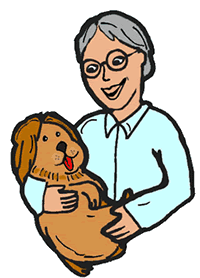|
Checking a Dog's Health.
Knowing how to check a dog's health is essential for the wellbeing of your pet. You don't need to be a veterinarian to be able to recognise whether your dog is healthy, or whether he might be ailing. The following tips should give you the basics of checking your dog's health.
- A healthy dog takes a keen interest in the world
about him. He's lively, inquisitive, and his movement is free from
discomfort. His eyes should be clear, and have a sparkle. His coat
should have a lustre to it.
- He should be ready for his food at meal time,
and relish what he is eating. His nose should be shiny, and moist. And his
overall demeanor should be one of soundness and vitality.
- The nose , ears and eyes: Her nose
should be dampish and clean. There should be no discharge,
crusting,runniness,or frequent sneezing. The eyes should
be bright, clear and free from any type of discharge. There should be no
swelling or redness.
- The should not drag her ears along the ground, shake
her head or scratch them frequently. There should be no odour from
the ear, no discharge, debris or dirt residing in the inner
ear.
- The teeth and mouth: His breath
should not be unpleasantly odious. The gums, inner mouth and tongue should
be a healthy shade of pink. There should be no traces of blood coming from
the gums. Coughing, gagging and vomiting are obvious reasons to
contact your veterinary surgery.

- Movement: She should move freely. Limping, stiffness,
or any unwillingness to move indicate problems. Stumbling, trembling and a
generalised lethargy are also obvious warning signs.
- Coat and skin:The
loss of hair, wounds, constant licking/biting/scratching. Any lumps,
bumps, abrasions. All of these need your
attention.
- Any breathing difficulties, evidence of parasites
or signs of blood in the stool? Does the stool's colour and consistency seem
normal?
- Is he straining to urinate, is the colour unusual, has it become
much more frequent?
- Has your dog lost weight? Is there any change
in how much water he's drinking?
- Has his intake of food altered? Does he
appear agitated, depressed? Would you say that he is his normal self?
Your dog can't tell you if he's got a problem, and many dogs seem
to soldier on even when quite ill. So being able to
recognise when your dog's problems began. And what those symptoms
are. Is going to help you, to help your vet, to reach a quick
and reliable diagnosis. And a happy outcome.
Regular veterinary
health checks for your dog are also advisable. Be sure to build a good relationship
with the person who you are going to entrust with your dog's
health. Why not........
Find out
more about Choosing a Vet.

|
|


